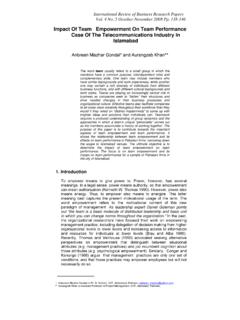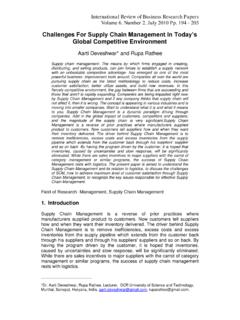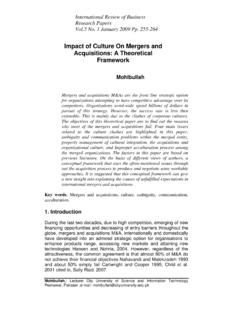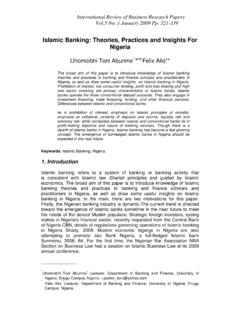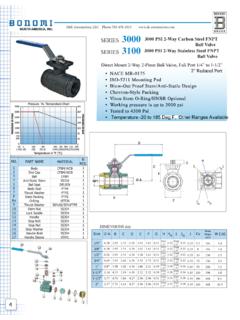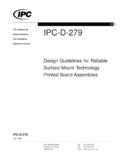Transcription of Relationship between Personality and Organizational ...
1 International Review of Business Research Papers Vol. 3 October 2007 Pp. 31-43. Relationship between Personality and Organizational citizenship behavior : does Personality Influence Employee citizenship ? Hossam Abu Elanain*. This study examines the Relationship between Personality and Organizational citizenship behavior (OCB). Hierarchical regression analysis on data from 164 employees working in the service sector in Dubai-after controlling for work locus of control and Organizational justice- indicated that openness to experience, conscientiousness, and emotional stability were valid predictors for OCB. However, both extraversion and agreeableness showed no significant Relationship with OCB. The intriguing finding of this study is that openness was significantly related to OCB. This differs from prior research on openness that found few significant relationships. The current study shows that openness to experience is a crucial Personality characteristic that is related to a person's capability to perform OCB.
2 Field of Research: Personality , Organizational citizenship behavior , UAE. 1. Introduction There have been a large number of studies that examined the Relationship of Personality traits to job performance. These studies have shown that there are significant relationships between Personality traits and performance dimensions ( , Barrick &. Mount, 1991; Barrick, Mount, and Judge, 2001; Barrick, Parks, and Mount, 2005; Hurtz & Donovan, 2000; Salgado, 1999). Personality traits refer to enduring patterns of thought, emotion, and behavior that are not likely to change over time and explain people's behavior across different situations (Costa & McCrae, 1989; Funder, 2001). The Five-Factor Model of Personality (FFM) or Big-Five has influenced the field of Personality during the last two decades, providing a significant degree of convergence in the trait-factor analytic psychology (Robertson &. Callinan, 1998). _____. *Hossam Abu Elanain, University of Dubai, United Arab Emirates Email: Elanain 32.
3 Organizational citizenship behavior (OCB), which is described as a discretionary behavior , has emerged as a popular area for study (Organ, 1990). citizenship behaviors are behaviors which are helpful to the company, yet they are not behaviors considered part of the core elements of the job. citizenship behaviors are often performed by employees to support the interests of the organization even though they may not directly lead to individual benefits (Moorman & Blakely, 1995). Previous studies have shown that there is a substantial variance in Personality - performance Relationship that remains unexplained ( , Barrick et al., 2001; Barrick, Parks, and Mount, 2005; Hogan & Holland, 2003; Hough, 1992; Hurtz & Donovan, 2000; Nikolaou and Roberston, 2001; Organ & Ryan, 1995). This is significant because it indicates that there are other individual variables and situational conditions that facilitate or constrain the influence of Personality traits on performance, and influence the Relationship between Personality traits and performance.
4 Hence, the present study used two control variables - one individual factor (work locus of control) and one situational factor ( Organizational justice) - in order to control their effects on OCB. Accordingly, the purpose of this study is to examine the Relationship between Big Five Personality traits and OCB after controlling the impact of the control variables. 2. Literature Review The Five-Factor Model (FFM) of Personality The FFM has achieved popular acceptance as a meaningful description of Personality traits (Saucier & Ostedorf, 1999). The FFM of Personality has also provided research in Personality with a clear measurement framework and is responsible for the growth of interest to Personality in the field of work and Organizational psychology. These five factors have been identified across a number of cultures and different languages, providing further support for the existence of the FFM and its universal application (McCare & Costa, 1997; Nikolaou and Roberston, 2001).
5 The five factors are usually labeled Extraversion (sociable vs. introverted), Agreeableness (cooperative vs. competitive), Conscientiousness (organized and planful vs. unorganized and careless), Emotional Stability (emotional stability vs. instability), and Openness to Experience (intellectual curiosity vs. preference for routine) (Costa &. McCrae, 1989). Organizational citizenship behavior (OCB). Organ (1988, p. 4) defined OCB as the individual behavior that is discretionary, not directly or explicitly recognized by the formal reward system, and that in the aggregate promotes the effective functioning of the organization . By discretionary, Organ (1988, p. 4) described OCB as the type of behavior that is not a part of the job description, but rather a mater of personal choice, such that its omission is not generally understood as punishable . 32. Elanain 33. Most of the studies examining the structure of OCB have agreed that it is a multidimensional concept ( Graham1989; Moorman & Blakely, 1995; Organ, 1988.)
6 Podsakoff, MacKenzie, Moorman, and Fetter, 1990). Graham (1989), for example, proposed a four-dimension model of OCB consisting of: interpersonal helping, individual initiative, personal industry, and loyal boosterism. Interpersonal helping involves helping co-workers in their jobs when such help is needed. Individual initiative is communicating to others in the work place to improve individual and group performance. Personal industry includes the performance of specific tasks above and beyond the call of duty. Finally, loyal boosterism involves the promotion of the Organizational image to outsiders (Moorman & Blakely, 1995). Predicting OCB from Personality Studies on contextual performance have suggested that Personality traits are likely to be particularly good predictors of contextual performance ( , Borman & Motowidlo, 1993; Morgeson, Reider, and Campion, 2005; Motowidlo & Van Scotter, 1994; Van Scotter & Motowidlo, 1996). A variety of meta-analytic research studies have found that conscientiousness, extraversion, agreeableness, and emotional stability are positively related to different aspects of contextual performance ( , Hogan & Holland, 2003.
7 Hough, 1992, Hurtz & Donovan, 2000; Organ & Ryan, 1995). There is increasing empirical evidence that Personality affects individuals' performance once they are hired into an organization ( , Barrick & Mount, 1991; Caldwell &. Burger, 1998; Tett, Jackson, and Rothstein, 1991). Organ (1990) argued that individual differences play an important role in predicting whether an employee would exhibit OCB. Hence, it is believed that some people, because of who they are, would be more likely to show OCB. Few studies examining the Relationship between individual differences and OCB have been conducted, and provided contradictory results ( , George, 1991; Nikolaou and Roberston, 2001; Organ and Konovsky, 1989; Smith, Organ' and Near, 1983). For example, Organ and Lingl (1995) examined the hypothesis that agreeableness and conscientiousness accounted for commonly shared variance between job satisfaction and citizenship behaviors. Their results showed that although agreeableness and conscientiousness were significant predictors of work satisfaction - positively and negatively, respectively - it was only conscientiousness that showed a reliable connection to OCB and only in respect to the dimension of generalized compliance.
8 In a meta-analysis published in the same year, Organ and Ryan (1995) found weak Relationship between agreeableness and conscientiousness, the two Personality dimensions included in their analyses, and OCB dimensions. In another study, Konovsky and Organ (1996) predicted that agreeableness would relate particularly with altruism, courtesy, and sportsmanship, whereas conscientiousness would relate with generalized compliance. The statistically significant correlations they came up with were quite weak: between agreeableness and courtesy and between conscientiousness and generalized compliance. The results 33. Elanain 34. of regression analyses showed that, with the exception of generalized compliance, the dispositional variables could not predict significant variance in OCB beyond that predicted by work attitudes. However, in the case of generalized compliance, the Personality dimension of conscientiousness was the strongest predictor of all, accounting for unique variance on the impersonal dimension of OCB.
9 Finally, the results of a recent study conducted in Greece did not show any significant Relationship between Personality and OCB (Nikolaou and Roberston, 2001). Given theses results, the search for individual differences predictors of OCB is still unsettled. Hence, the purpose of this study is to understand an individual difference which may cause OCB. 3. Hypotheses Development The present study examines the Relationship between Personality traits and OCB. Barrick, et al. (2005) have described extraversion as key dispositional determinant of social behavior . People who are high in extraversion are generally sociable, assertive, active, bold, energetic, adventuresome, and expressive (Goldberg, 1992). In contrast, those who are low in extraversion are timid, submissive, silent, and inhibited. Thus, those who are highly extraverted display more flexible behaviors that make them more likely to show OCB. Hypothesis 1: Extraversion will be positively related to OCB.
10 Empirical evidence showed that agreeableness is significantly related to interpersonal performance (Mount, Barrick & Stewart, 1998). People who are high in agreeableness are generally friendly, good natured, cooperative, helpful, courteous, and flexible (Barrick & Mount, 1991; Witt, Burke, Barrick & Mount, 2002). In work contexts, agreeable employees show higher levels of interpersonal competence (Witt et al., 2002). and collaborate effectively when joint action is needed (Mount et al., 1998). Thus, it is expected that persons high on agreeableness are more likely to perform OCB. Hypothesis 2: Agreeableness will be positively related to OCB. Regarding the Personality trait of conscientiousness, people who are high in conscientiousness generally perform better at work than those who are low in conscientiousness (Barrick & Mount, 1991). Conscientious individuals can perform their part of the work with a minimum of oversight (Morgeson et al., 2005). Moreover, conscientious individuals are dependable, efficient, and hardworking.
